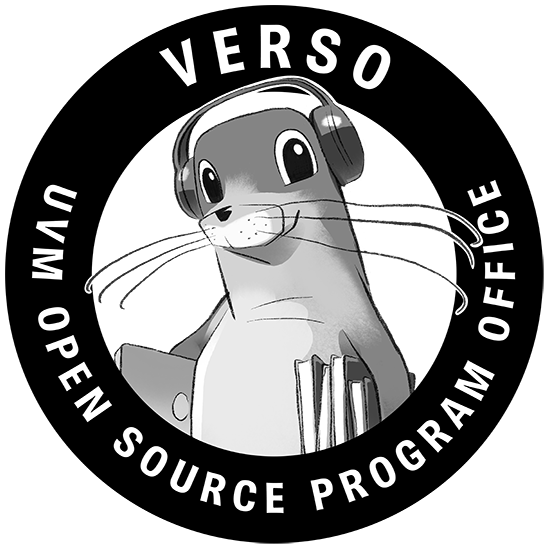The VERSO Open Source Registry connects researchers and organizations with open-source software solutions designed for impactful research and collaboration. By curating a comprehensive directory, it fosters innovation, accessibility, and knowledge-sharing within the research community. If you want to be added, removed or edit an entry please connect with us: https://verso.w3.uvm.edu/connect/
Organizations
Vermont Research Open Source Program Office (VERSO)
GitHub Organization: https://github.com/VERSO-UVM
GitLab Organization: https://gitlab.uvm.edu/verso-uvm-ospo
The Vermont Research Open Source Program Office (VERSO) at the University of Vermont, is your go-to resource for all things open science
Heard and Understood
GitHub Organization: https://github.com/heard-and-understood
This organization supports the mission of the Vermont Conversation Lab at the University of Vermont to understand and promote human connection in serious illness.
Open Research Community Student Club
GitHub Organization: https://github.com/Open-Research-Community
Social-Ecological Gaming and Simulation (SEGS) Lab
GitHub Organization: https://github.com/UVM-SEGS-Lab
The Social-Ecological Gaming and Simulation (SEGS) Lab is a transdisciplinary research lab focused on modeling and simulating Social-Ecological Systems (SESs) from a complex systems perspective.
Morphology, Evolution & Cognition Laboratory
GitHub Organization: https://github.com/mec-lab
Website: http://www.meclab.org/
The Morphology, Evolution & Cognition Laboratory was founded to create generally intelligent machines through crowdsourcing, embodied cognition, and computational evolution. See our People and Publications pages (or check out our YouTube Channel and Twitter feed) to learn more.
Frietze Lab
GitHub Organization: https://github.com/FrietzeLabUVM
Website: https://site.uvm.edu/frietzelab/
Dr. Seth Frietze investigates the molecular mechanisms of gene expression in the pathological progression of disease ranging from blood cancer genomics to persistent viral infections, including varicella zoster virus (VZV), which causes herpes, chickenpox and shingles.
University of Vermont Neurobotics Lab
GitHub Organization: https://github.com/uvm-neurobotics-lab The Neurobotics Lab at the University of Vermont designs autonomous robots and decision-making systems inspired by biology, psychology, and neuroscience, with applications in fields like healthcare and the environment. Led by Professor Nick Cheney, the lab specializes in bio-inspired optimization algorithms for artificial neural networks and is part of the Vermont Complex Systems Center.Pespeni Lab at UVM
GitHub Organization: https://github.com/PespeniLab
The Pespeni Lab studies how marine populations adapt to local conditions and may develop resilience to future environmental changes, focusing on linking genes to phenotypes. Using marine invertebrates, the lab integrates genomics, physiology, developmental biology, and ecology to uncover adaptive traits and the processes shaping them
The Joint Lab
GitHub Organization: https://github.com/joint-lab
Website: https://joint-lab.github.io/
The Joint Lab is a collaborative explorations across sciences with models and data hosted at the Vermont Complex System Center. It includes the Laboratory for Structure and Dynamics (LSD) which focuses on the coevolution of structure and dynamics in complex systems and Complex Data Laboratory (CDL) focused on making sense of complex data by bridging the gap between statistics, computer science and complex systems.
Gotelli Lab
GitHub Organization: https://github.com/GotelliLab
Website: https://www.uvm.edu/~ngotelli/homepage.html
The Gotelli Lab studies the factors that determine species composition, abundance, and community structure in animal and plant populations, focusing on competition, predation, and extinction risk. Current research includes aquatic ecosystem tipping points, climate change impacts on ant communities, and biodiversity analysis using null models.
CS Crew Student Club
Gitlab Organization: https://gitlab.uvm.edu/cs-crew
Spatial Analysis Lab
GitHub Organization: https://gitlab.uvm.edu/SAL
Website: https://site.uvm.edu/sal/
The Spatial Analysis Laboratory (SAL) at the University of Vermont is a leading GIS research facility that collaborates with industry, government, and non-profits to solve complex spatial problems. Their work includes ecosystem assessments, land-cover mapping, biodiversity analysis, LiDAR processing, and web-based mapping.
Emily Bruce Lab
GitHub Organization: https://github.com/emilybrucelab
Website: https://emilybrucelab.com/
We are a research laboratory studying RNA viruses, within the Department of Microbiology and Molecular Genetics (MMG) and the Translational Global Infectious Disease Research (TGIR) COBRE at the University of Vermont.
Projects
CompleX Group Interactions (XGI)
Documentation: https://xgi.readthedocs.io/en/stable/
The CompleX Group Interactions (XGI) library provides data structures and algorithms for modeling and analyzing complex systems with group (higher-order) interactions. Many datasets can be represented as graphs, where pairs of entities (or nodes) are related via links (or edges). Examples are road networks, energy grids, social networks, neural networks, etc. However, in many other datasets, more than two entities can be related at a time. For example, many scientists (entities) can collaborate on a scientific article together (links), and multiple email accounts (entities) can all participate on the same email thread (links). In this latter case, graphs no longer present a viable alternative to represent such datasets. It is for this kind of datasets, where the interactions are given among groups of more than two entities (also called higher-order interactions), that XGI was designed for.
XGI is implemented in pure Python and is designed to seamlessly interoperate with the rest of the Python scientific stack (numpy, scipy, pandas, matplotlib, etc). XGI is designed and developed by network scientists with the needs of network scientists in mind.
Noisy Networks Measurements
Github: https://github.com/jg-you/noisy-networks-measurements
Bayesian reconstruction of networks from noisy measurements, with examples. The theory explaining these models is presented in “Bayesian inference of network structure from unreliable data”, by J.-G. Young, G. T. Cantwell and M.E.J. Newman. Here we provide several examples of models coded in Stan, as well as a tutorial reproducing one of the case study of the paper.
Allotaxonometer For All
Github: https://github.com/jstonge/allotaxonometer
Project Page: https://verso.w3.uvm.edu/allotaxonometer/
Demonstration Page: https://observablehq.com/@jstonge/allotaxonometer-for-all
The AlloTaxonometer was a Graduate Student Project to translate the previouse version of AlloTaxonometer from Matlab to Javascript. VERSO provided project management and added common industry practices like using Jira, creating stories and epics, doing standups during the week, creating a product requirements doc (much of which was used in this page) and ensuring the final product would be much more open source friendly.
Open Source Connector
Github: https://github.com/kefortney/open-source-connector
Webpage: https://opensourceconnector.com/
This project aims to create a new forum for collaboration and knowledge sharing around open-source software development in Vermont and the surrounding region. Our goal is to support engagement between academia, industry, and government while driving real impact in the local community. This repo holds the code for the meetup website/
